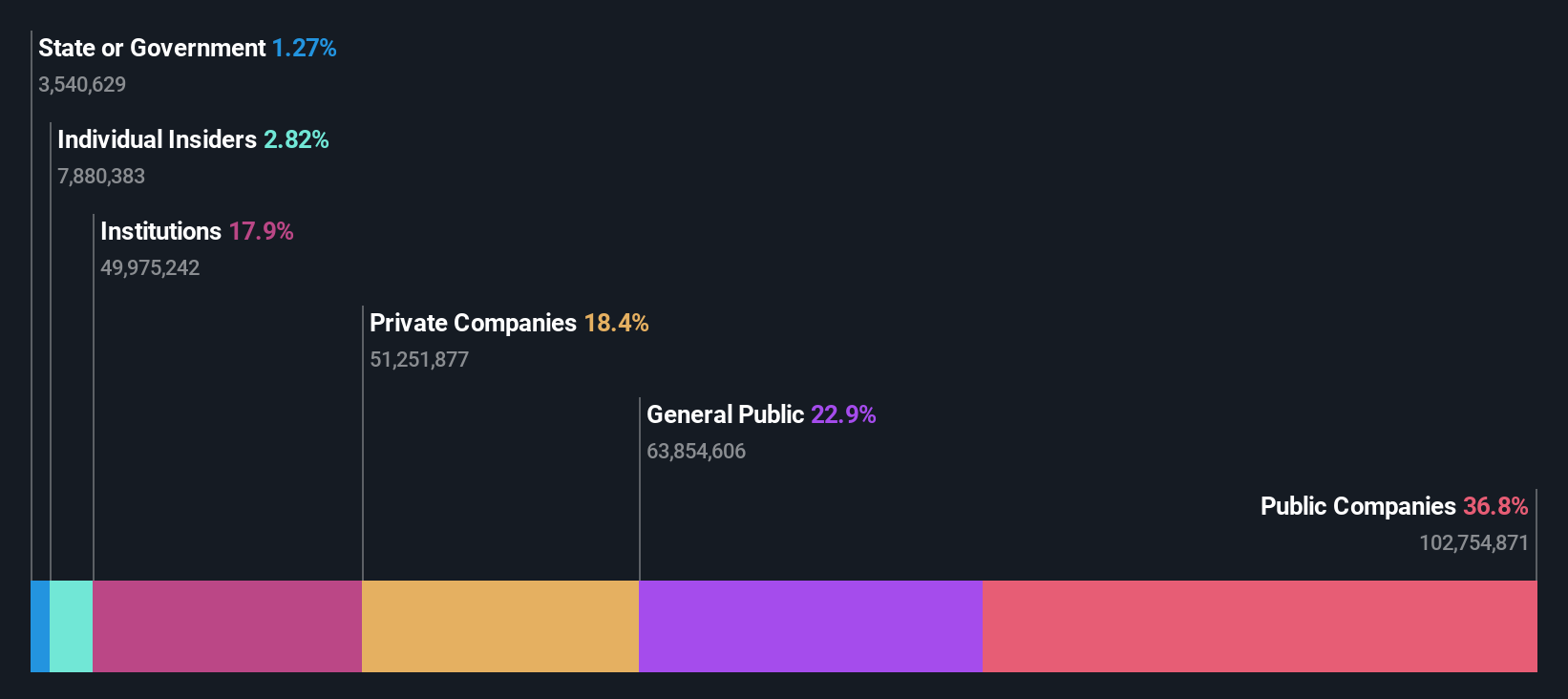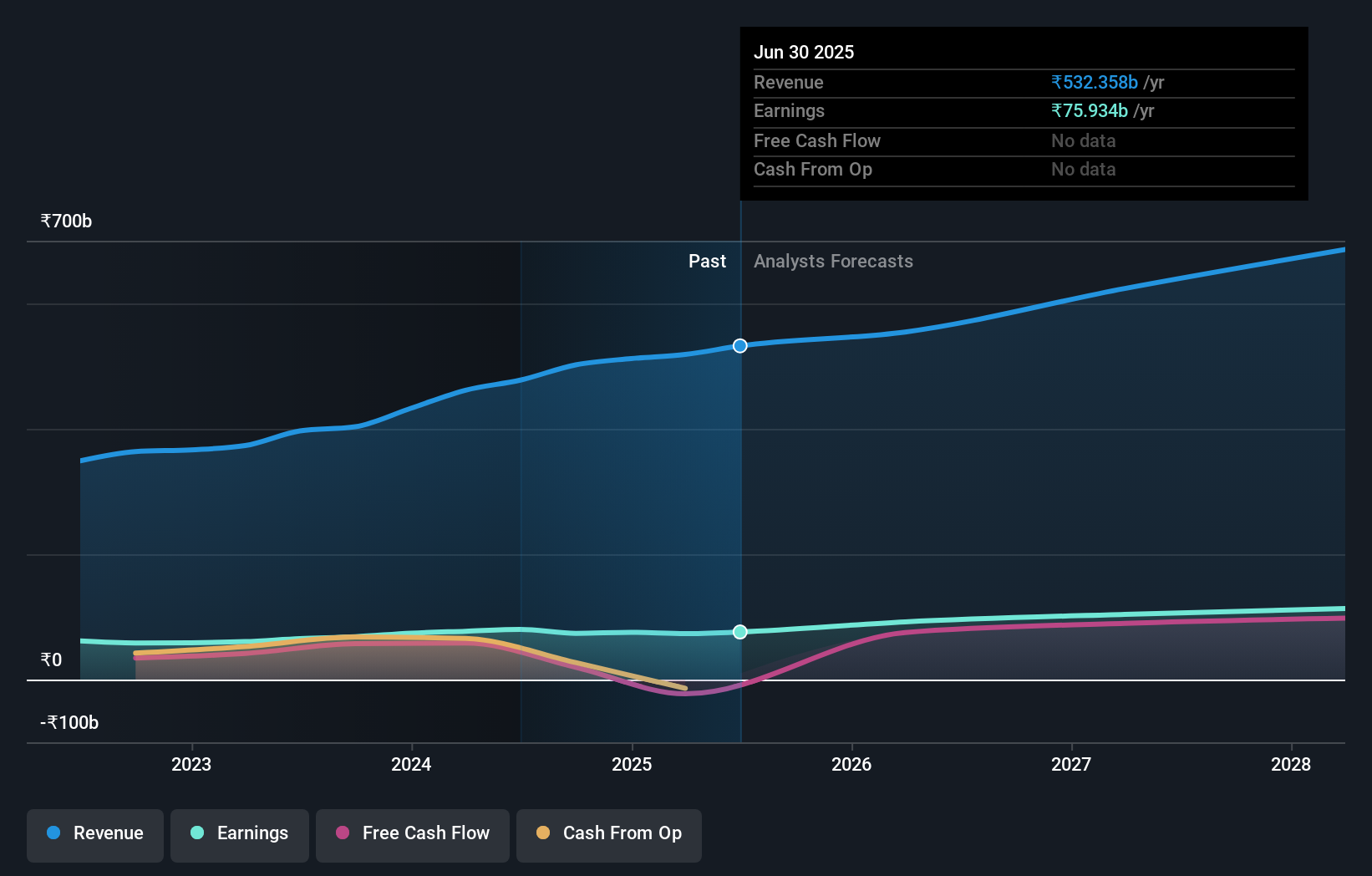Bajaj Auto Limited (NSE:BAJAJ-AUTO) stock most popular amongst public companies who own 37%, while individual investors hold 23%
Key Insights
- Bajaj Auto's significant public companies ownership suggests that the key decisions are influenced by shareholders from the larger public
- A total of 3 investors have a majority stake in the company with 52% ownership
- Institutions own 18% of Bajaj Auto
If you want to know who really controls Bajaj Auto Limited (NSE:BAJAJ-AUTO), then you'll have to look at the makeup of its share registry. The group holding the most number of shares in the company, around 37% to be precise, is public companies. That is, the group stands to benefit the most if the stock rises (or lose the most if there is a downturn).
Meanwhile, individual investors make up 23% of the company’s shareholders.
Let's take a closer look to see what the different types of shareholders can tell us about Bajaj Auto.
Check out our latest analysis for Bajaj Auto

What Does The Institutional Ownership Tell Us About Bajaj Auto?
Institutions typically measure themselves against a benchmark when reporting to their own investors, so they often become more enthusiastic about a stock once it's included in a major index. We would expect most companies to have some institutions on the register, especially if they are growing.
Bajaj Auto already has institutions on the share registry. Indeed, they own a respectable stake in the company. This suggests some credibility amongst professional investors. But we can't rely on that fact alone since institutions make bad investments sometimes, just like everyone does. It is not uncommon to see a big share price drop if two large institutional investors try to sell out of a stock at the same time. So it is worth checking the past earnings trajectory of Bajaj Auto, (below). Of course, keep in mind that there are other factors to consider, too.

Hedge funds don't have many shares in Bajaj Auto. Looking at our data, we can see that the largest shareholder is Bajaj Holdings & Investment Limited with 37% of shares outstanding. Meanwhile, the second and third largest shareholders, hold 12% and 3.6%, of the shares outstanding, respectively. In addition, we found that Rajivnayan Bajaj, the CEO has 0.6% of the shares allocated to their name.
After doing some more digging, we found that the top 3 shareholders collectively control more than half of the company's shares, implying that they have considerable power to influence the company's decisions.
While studying institutional ownership for a company can add value to your research, it is also a good practice to research analyst recommendations to get a deeper understand of a stock's expected performance. Quite a few analysts cover the stock, so you could look into forecast growth quite easily.
Insider Ownership Of Bajaj Auto
While the precise definition of an insider can be subjective, almost everyone considers board members to be insiders. Management ultimately answers to the board. However, it is not uncommon for managers to be executive board members, especially if they are a founder or the CEO.
I generally consider insider ownership to be a good thing. However, on some occasions it makes it more difficult for other shareholders to hold the board accountable for decisions.
Shareholders would probably be interested to learn that insiders own shares in Bajaj Auto Limited. The insiders have a meaningful stake worth ₹69b. It is good to see this level of investment. You can check here to see if those insiders have been buying recently.
General Public Ownership
With a 23% ownership, the general public, mostly comprising of individual investors, have some degree of sway over Bajaj Auto. This size of ownership, while considerable, may not be enough to change company policy if the decision is not in sync with other large shareholders.
Private Company Ownership
We can see that Private Companies own 18%, of the shares on issue. It's hard to draw any conclusions from this fact alone, so its worth looking into who owns those private companies. Sometimes insiders or other related parties have an interest in shares in a public company through a separate private company.
Public Company Ownership
It appears to us that public companies own 37% of Bajaj Auto. We can't be certain but it is quite possible this is a strategic stake. The businesses may be similar, or work together.
Next Steps:
It's always worth thinking about the different groups who own shares in a company. But to understand Bajaj Auto better, we need to consider many other factors. Be aware that Bajaj Auto is showing 1 warning sign in our investment analysis , you should know about...
If you would prefer discover what analysts are predicting in terms of future growth, do not miss this free report on analyst forecasts.
NB: Figures in this article are calculated using data from the last twelve months, which refer to the 12-month period ending on the last date of the month the financial statement is dated. This may not be consistent with full year annual report figures.
Valuation is complex, but we're here to simplify it.
Discover if Bajaj Auto might be undervalued or overvalued with our detailed analysis, featuring fair value estimates, potential risks, dividends, insider trades, and its financial condition.
Access Free AnalysisHave feedback on this article? Concerned about the content? Get in touch with us directly. Alternatively, email editorial-team (at) simplywallst.com.
This article by Simply Wall St is general in nature. We provide commentary based on historical data and analyst forecasts only using an unbiased methodology and our articles are not intended to be financial advice. It does not constitute a recommendation to buy or sell any stock, and does not take account of your objectives, or your financial situation. We aim to bring you long-term focused analysis driven by fundamental data. Note that our analysis may not factor in the latest price-sensitive company announcements or qualitative material. Simply Wall St has no position in any stocks mentioned.
About NSEI:BAJAJ-AUTO
Bajaj Auto
Engages in the development, manufacture, and distribution of automobiles in India and internationally.
Adequate balance sheet average dividend payer.
Similar Companies
Market Insights
Community Narratives



